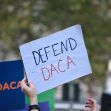DACA, which is short for the Deferred Action for Childhood Arrivals, is a program that allows qualifying young immigrants to stay in the country, even though they are undocumented. Former Secretary of Homeland Security, Janet Napolitano, initiated the policy.
The Trump Administration's approach toward immigration does not conform with DACA. President Trump promised to limit immigration aggressively, and in 2017, the then-Secretary of Homeland Security chose to rescind DACA. Starting in September of 2017, the program stopped taking new applications.
Federal district courts in multiple states, including New York, California, Maryland, and the District of Columbia, issued rulings in
response to challenges against the program's end. In June of 2020, the Supreme Court reviewed the issue, and in a 5-4 ruling, stated that the move to end the program was illegal.
The win proved short-lived for DACA hopefuls as the current Secretary of Homeland Security again moved to limit DACA's protections. The Court will once more adjudicate the legality of the limitations on DACA. For the many young immigrants who relied on the policy, the move is devastating and leaves them in limbo with uncertainty about their futures.
Who Does DACA Protect and How?
DACA applies to young people who moved to the United States as children. Many of these individuals, referred to as "Dreamers," came to America at such young ages that they cannot remember their lives before living in this country. When DACA went into effect, these undocumented individuals were suddenly afforded many opportunities that had previously eluded them. DACA recipients went to school, graduated with college and other advanced degrees, obtained employment, and lived without the fear of sudden deportation. Deportation for these individuals to their “home countries” would for many mean being sent to a place that would be entirely foreign and unfamiliar. Immigration attorneys point out that some who were using DACA to stay in the country were brought to the United States by parents fleeing violence in places like El Salvador. In the worst scenarios, deportation can be tantamount to a death sentence.
It is also worth noting that if a DACA recipient commits a crime, that person will no longer be eligible for the program's protections, and authorities can move to deport them.
Those in favor of DACA praise it for humanitarian reasons and for the fact that the policy allows
Dreamers the ability to work and support themselves. Many individuals who are here thanks to DACA have been able to make a life for themselves, pay taxes, and contribute to their communities. The people using DACA tend to be those who want to live honest and productive lives, while those who commit crimes cannot benefit from the program. To qualify, applicants must undergo a background check, cannot have a criminal record, and have to be in school, recent graduates, or honorably discharged from the military.
What are the Arguments Against DACA?
The majority of the American public appears to support allowing Dreamers to stay in the country. While some people may object to what is effectively a work-around to the standard immigration system, the challenges to DACA are largely based on the way the government initiated the program.
President Trump and other officials in the Administration argue that only Congress should enact a law permitting Dreamers to stay in the country. Indeed, lawmakers made numerous attempts to codify DACA into law, but none have succeeded.
The DACA program instead is a form of prosecutorial discretion, which was enacted by the executive branch. Of course, the same branch and an official with the same title that began the program attempted to end DACA. Still, the Supreme Court found that the effort to end the program was not legal.
How Did the Supreme Court Determine that the DACA Repeal was a Violation of the Law?
In its 5-to-4 ruling against the Trump Administration's changes to DACA, the Court did not state that the current Secretary of Homeland Security cannot change the policy, only that the effort to do so was not proper. The Court noted that the changes violated the Administrative Procedures Act (APA). The move to end DACA protections did not come with a full explanation as to the government’s reasons for changing course.
In no way did the Supreme Court prevent another attempt to end DACA. Instead, the Court told the Administration that if it wishes to end DACA, it must comply with the APA, provide a full explanation of why it is changing the program, and consider alternatives to DACA.
Given the basis of the Court's decision, it should not come as a surprise that the current Administration moved against the law again, just six weeks later.
How is DACA Being Challenged Now?
The new directive states that the department will not process new applications, and the renewal process is being cut from two years to one year, while the fees to maintain DACA status are going to be two times as high. Since the Supreme Court decision, the United States Citizenship and Immigration Services denied every one of the 3,189 new DACA applications.
What is Next for DACA?
The Supreme Court will not likely hear challenges to the law before the presidential election. The outcome could signal the future of the law. Following the recent death of liberal Justice Ruth Bader Ginsberg, there is even more uncertainty about the future for America's roughly 650,000 Dreamers.






